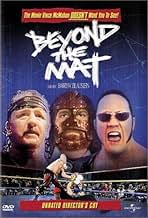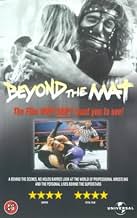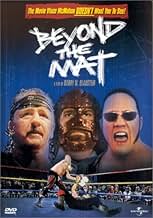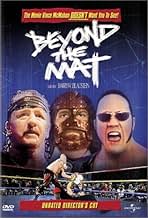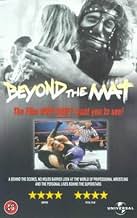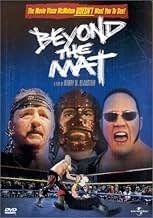IMDb RATING
7.6/10
9.6K
YOUR RATING
A heartfelt documentary focusing on the day-to-day lives of professional wrestlers, some on the rise, some on the wane, and others fighting for their lives.A heartfelt documentary focusing on the day-to-day lives of professional wrestlers, some on the rise, some on the wane, and others fighting for their lives.A heartfelt documentary focusing on the day-to-day lives of professional wrestlers, some on the rise, some on the wane, and others fighting for their lives.
- Awards
- 3 wins & 2 nominations
James Ware
- Self
- (as Coco B. Ware)
- Director
- Writer
- All cast & crew
- Production, box office & more at IMDbPro
Storyline
Did you know
- TriviaWrestling legend Roddy Piper described this film as "The best documentary ever made on professional wrestling."
- Quotes
Jake Roberts: My mother was 13 years old when I was born. Why? Because my dad raped a little girl that was in a room asleep. My dad was going out with my mother's mother. There you go. There's some bones for Jake the Snake.
- Crazy creditsClosing dedication: This film is dedicated to my wife, Lorrie and our children, Kasey and Corey, who have stood by patiently with love and support as I blabbed about wrestling for the last five years.
- Alternate versionsThe DVD edition of Beyond the Mat has several minutes of deleted footage, plus audio commentaries by Mick Foley & Terry Funk
- ConnectionsFeatured in WatchMojo: Top 10 Controversial Documentary Movies (2015)
Featured review
You've got to wonder about wrestlers. They're always on the road, they're always carrying knocks and injuries, they don't get paid much (except the few at the absolute top), they get no respect from the public at large, they don't actually compete in the legitimate sense of the word and the vast majority of them are quickly forgotten. Yet nearly all of the wrestlers in Beyond the Mat continue to seek the spotlight. Why? I guess Terry Funk sums it up best: "It's fun."
However, it's a strange type of fun. After all, I'm not sure that most people would class being hit over the head with steel chairs as 'fun'. Nor would most people relish the thought of being thrown off a steel cage. But as the film points out, wrestlers are hardly normal. At the same time, though, they're still people. They have the same problems as all of us. It's just that they earn their living by running around in spandex and by beating the crap out of one another.
Of all the different strands in Beyond the Mat, I like the Terry Funk section the most. It just shows how bizarre wrestling is. Here you have a man in his fifties who has degenerative arthritis and who wakes up in the morning, like many old men, in his y-fronts. Yet in the ring he's a bloodthirsty maniac. But at the same time he's a loving father who cries at his daughter's wedding and he has an excellent rapport with the man who he has his most brutal matches with. As dim-witted as wrestling is, nothing out of the ring is simple.
And the Funk section illustrates the problem that most wrestler face: they can't give up the spotlight. I mean, just take one of Funk's friends, Dennis Stamp. He hasn't wrestled in years but he still trains (by jumping up and down on a trampoline in his underwear) in the vain hope of getting another match. And when he's finally made the referee in Funk's 'retirement' match, he's beside himself with excitement at the prospect of being part of the main event. It seems like when you don't get paid much, when you're forced to do lousy jobs and when no one really knows who you are, the only compensation for such a depressing existence is a few cheers.
But although the film touches upon the dark side of wrestling, it's quite touching seeing Funk trying to persuade his friend Stamp to be part of his match. The man may be vicious in the ring, but outside it he's warm-hearted. And I like the way that when he persuades his friend to be part of his match, and when he walks away, he nearly trips over. Despite everything, he's just a lovable old guy. However, I also like the scene because Stamp is such a fool. He's so desperate to be someone and so desperate to be recognised, that he cuts a promo when he's explaining why he can't make the event ("I'm not booked!). It's as if reality and wrestling are blurred. He can't tell them apart.
Another wrestler who's been messed up by the business is Jake Roberts. He doesn't get on with his daughter and he's forced to pay for his drug habit by wrestling in fourth-rate events in backwater towns. He's even filmed urinating into a bucket and then falling asleep backstage. It really does give a depressing picture of what it is to be a professional wrestler your existence revolves around the road, run down hotels and small towns. No wonder so many of them are screwed up. But Roberts has even more reason to be screwed up than most. He's the product of a rape and his sister was kidnapped and murdered. And he has a terrible relationship with his father. They can barely look at one another. There's no connection there at all. And it's quite shocking hearing Roberts describe how he gave up his dreams just to shove wrestling down his father's throat (his dad was a wrestler and Robert's resolved to be better than him). Suddenly you can see why Robert's created such a compelling character. He was just drawing on his own life. Again reality and wrestling is blurred.
Perhaps the only one in the film that has a decent handle on things is Mick Foley. He has a clear plan (he wants to retire by the age of 35) and he has a solid family to support him. Somehow you know that he's going to be fine. Not that there aren't a few bumps on the way. In one scene he's forced to watch footage of his wife and kids screaming when he's repeatedly hit over the head with a steel chair. It's a real wake-up call. I mean, as entertaining as it is for sadistic bastards like myself, you just can't make you family endure that time after time. But it's his family that will keep Foley on the straight and narrow. However, for the other wrestlers who don't have stable personal lives, they'll have to seek love in cheers and applause. It seems like wrestling is a drug that most wrestlers can't crack.
Not that a few don't try. There's an amusing scene when a wrestler called New Jack, who has four justifiable homicides, auditions for a Hollywood casting agent. The people there are slimy beyond belief. They make the carnies in wrestling look honest in comparison.
But why the film succeeds so emphatically is because everything is just presented as it is. No judgements are made and nobody is looked down upon. Yeah, wrestling may be something on the fringes of society, but the film shows that as weird as it is, the people aren't really that weird after all. They're just people with the same problems we all have.
However, it's a strange type of fun. After all, I'm not sure that most people would class being hit over the head with steel chairs as 'fun'. Nor would most people relish the thought of being thrown off a steel cage. But as the film points out, wrestlers are hardly normal. At the same time, though, they're still people. They have the same problems as all of us. It's just that they earn their living by running around in spandex and by beating the crap out of one another.
Of all the different strands in Beyond the Mat, I like the Terry Funk section the most. It just shows how bizarre wrestling is. Here you have a man in his fifties who has degenerative arthritis and who wakes up in the morning, like many old men, in his y-fronts. Yet in the ring he's a bloodthirsty maniac. But at the same time he's a loving father who cries at his daughter's wedding and he has an excellent rapport with the man who he has his most brutal matches with. As dim-witted as wrestling is, nothing out of the ring is simple.
And the Funk section illustrates the problem that most wrestler face: they can't give up the spotlight. I mean, just take one of Funk's friends, Dennis Stamp. He hasn't wrestled in years but he still trains (by jumping up and down on a trampoline in his underwear) in the vain hope of getting another match. And when he's finally made the referee in Funk's 'retirement' match, he's beside himself with excitement at the prospect of being part of the main event. It seems like when you don't get paid much, when you're forced to do lousy jobs and when no one really knows who you are, the only compensation for such a depressing existence is a few cheers.
But although the film touches upon the dark side of wrestling, it's quite touching seeing Funk trying to persuade his friend Stamp to be part of his match. The man may be vicious in the ring, but outside it he's warm-hearted. And I like the way that when he persuades his friend to be part of his match, and when he walks away, he nearly trips over. Despite everything, he's just a lovable old guy. However, I also like the scene because Stamp is such a fool. He's so desperate to be someone and so desperate to be recognised, that he cuts a promo when he's explaining why he can't make the event ("I'm not booked!). It's as if reality and wrestling are blurred. He can't tell them apart.
Another wrestler who's been messed up by the business is Jake Roberts. He doesn't get on with his daughter and he's forced to pay for his drug habit by wrestling in fourth-rate events in backwater towns. He's even filmed urinating into a bucket and then falling asleep backstage. It really does give a depressing picture of what it is to be a professional wrestler your existence revolves around the road, run down hotels and small towns. No wonder so many of them are screwed up. But Roberts has even more reason to be screwed up than most. He's the product of a rape and his sister was kidnapped and murdered. And he has a terrible relationship with his father. They can barely look at one another. There's no connection there at all. And it's quite shocking hearing Roberts describe how he gave up his dreams just to shove wrestling down his father's throat (his dad was a wrestler and Robert's resolved to be better than him). Suddenly you can see why Robert's created such a compelling character. He was just drawing on his own life. Again reality and wrestling is blurred.
Perhaps the only one in the film that has a decent handle on things is Mick Foley. He has a clear plan (he wants to retire by the age of 35) and he has a solid family to support him. Somehow you know that he's going to be fine. Not that there aren't a few bumps on the way. In one scene he's forced to watch footage of his wife and kids screaming when he's repeatedly hit over the head with a steel chair. It's a real wake-up call. I mean, as entertaining as it is for sadistic bastards like myself, you just can't make you family endure that time after time. But it's his family that will keep Foley on the straight and narrow. However, for the other wrestlers who don't have stable personal lives, they'll have to seek love in cheers and applause. It seems like wrestling is a drug that most wrestlers can't crack.
Not that a few don't try. There's an amusing scene when a wrestler called New Jack, who has four justifiable homicides, auditions for a Hollywood casting agent. The people there are slimy beyond belief. They make the carnies in wrestling look honest in comparison.
But why the film succeeds so emphatically is because everything is just presented as it is. No judgements are made and nobody is looked down upon. Yeah, wrestling may be something on the fringes of society, but the film shows that as weird as it is, the people aren't really that weird after all. They're just people with the same problems we all have.
- Ricky_Roma__
- Oct 22, 2005
- Permalink
Details
- Release date
- Country of origin
- Official site
- Language
- Also known as
- Beyond the Mat: Unrated Director's Cut
- Filming locations
- Production companies
- See more company credits at IMDbPro
Box office
- Budget
- $500,000 (estimated)
- Gross US & Canada
- $2,053,648
- Opening weekend US & Canada
- $9,532
- Oct 24, 1999
- Gross worldwide
- $2,053,648
- Runtime1 hour 42 minutes
- Color
- Sound mix
- Aspect ratio
- 1.85 : 1
Contribute to this page
Suggest an edit or add missing content



